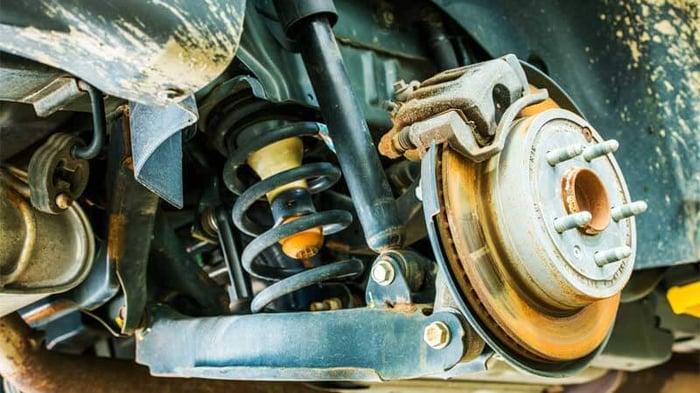A bad suspension can really get you down. Literally. And the last thing you need when you’re worried about your suspension is to be worried about how much it’s going to cost to fix that suspension.
In this article, we’ll lay out how to spot suspension problems, what’s involved in your car’s suspension, and what you’ll need to pay to fix that suspension.
Signs You Need to Fix Your Suspension
These days, most cars are equipped with a suspension warning light on the dash. When suspension problems get bad enough that the car can detect them, you’ll see the warning light illuminate with a message like “suspension failure.” But often, by this time, your suspension issue has become a major problem.
However, as with all car problems, early detection can help you fix a small problem before it becomes a big one. That can save you money and save wear and tear on your car.
Fortunately, there are a few things you can do to look for suspension problems if you think there might be an issue:
- Long stops: Your suspension is part of your braking system, absorbing much of the force of coming to a stop. If your vehicle is consistently taking a longer time to stop, you might have a soft or broken suspension.
- Bounce test: One way to check for problems is to perform the simple bounce test. Press down hard at each corner of your car. If the bumper takes a long time to return to its normal height or bounces up and down a lot, you likely have an issue with that corner.
- Too much noise: When your suspension is working properly, you probably won’t be able to hear it. If you’re noticing a lot of noise coming from your suspension, it is likely in need of service.
- Leaning or squatting: If you notice your car leaning to one side, there is probably an issue with your suspension. This happens most often with the rear of the car sagging down, giving the car a “squatting” appearance.
- Uneven tire wear: Check your tires. If they are wearing out unevenly, it could be that they need balancing and rotating. However, it can also indicate a suspension problem.
Coil Spring Suspension or Air Suspension?
While there are other types of suspensions, most cars have one of two types: a coil suspension or an air suspension. So what’s the difference?
Coil suspensions are a more traditional suspension. They look exactly like their name sounds—with a coil spring wrapped over a metal strut. These suspensions use mechanical resistance to keep your car at its proper ride height.
Air suspensions, on the other hand, are much more recent, more advanced, and more complicated. These suspension systems are active suspension systems, which means they respond to small changes in the road to provide a smoother ride. Instead of coil springs, they use pressurized air to hold your car up.
If you’re unsure which type of suspension you have, check your owner’s manual. You can also take a quick look where they connect to the wheels. It should be obvious right away.
Most likely, if you’re experiencing persistent suspension problems, you’ve got an air suspension. That’s because air suspensions have a lot more that can go wrong with them.
How Air Suspensions Work
As we mentioned, air suspensions are complex systems. They rely on a network of interconnected parts controlled by a computer to operate properly. Here’s the gist of how an air suspension works:
1. Ride height sensors at each wheel monitor bumps and dips in the road. Then, they send that information to a special computer called a suspension control module.
2. The suspension control module analyzes the information from the ride height sensors and determines how much air each air strut needs and sends that information to the air compressor.
3. The air compressor generates the pressurized air it needs to inflate the springs. Then, it pumps that air to the air springs via rubber air lines.
4. Once the air reaches the air springs, they inflate (or deflate) to the proper height.
You can see where this gets complicated. And if you’ve taken cars in for repairs before, you know that complicated can mean expensive.
How Much Does it Cost to Fix an Air Suspension?
There’s no way around it: it costs a lot to fix an air suspension. All of these high-tech components come with high-tech prices. Here are a few average prices from RepairPal for some of your most important air suspension components.
Air suspension component costs:
- Air spring: $1,200
- Air compressor: $875
- Suspension control module: $685
- Ride height sensor: $450
Now, remember that your car’s suspension has four air struts and four ride height sensors. And once one of those components wears out, the rest are soon to follow.
That means that if you need to replace one of them, you’ll need to replace all of them to truly fix your suspension. By the time you do that, you might even exceed the total value of your vehicle.

Other Air Suspension Repair Costs
It’s not just the parts that are responsible for the high cost of fixing a suspension. You’ve also got to pay someone to do the labor. And when it comes to working on these highly complex systems, that labor can cost quite a bit.
Labor costs to replace air suspension components:
- Air spring: $200
- Air compressor: $130
- Suspension control module: $90
- Ride height sensor: $70
You can see how the cost to fix a suspension can easily get out of hand. Again, these are just the costs to replace one of these components. Added together, the issues with your air suspension can easily turn into a nightmare scenario.
A Cheaper Way to Fix Your Suspension
Here’s the thing: you don’t have to keep your air suspension. While these active suspensions provide a nice ride while they last, they tend to not last. As you’ve just seen, the costs to fix that air suspension over and over again can quickly get out of hand.
You can, instead, convert your car to the aforementioned coilover suspension and never have to worry about compressors or control modules ever again. And you can do it at a fraction of what it costs to fix an air suspension completely with a suspension replacement kit.
Cost to Fix Your Suspension with a Strutmasters Kit
A suspension replacement kit does away with your air suspension in favor of a robust coilover suspension for much cheaper than it would cost to fix your air suspension. Take the Lexus LS 460, for example. An OEM replacement front air strut costs just under $1,500 for the part alone.
However, you can convert your Lexus to a sturdy, reliable coilover kit for less than $1,000. That’s your entire suspension replaced for less than the cost of just one air strut.
And don’t mistake the affordable price for a cheap fix. These kits are made of high-quality, durable materials right here in the USA. With cold-wound steel springs and rugged steel struts, you’ll have a safe, sturdy ride for a long time to come.
Each Strutmasters kit comes with a one-year warranty on parts and a Limited Lifetime Warranty on the springs themselves. That’s our vote of confidence, but it can help offer you peace of mind on the road and relief from the threat of expensive repair bills.
Shop Strutmasters Suspension Parts and Save
Tired of waiting around for the next suspension failure? Ready to get back on the road with confidence? Use the tool below to find a kit for your make and model. Our engineers have hand-tailored each kit to give the ideal ride to the vehicle they fit, so be sure to get exactly the right one.
Want more information about our suspension replacement kits or want to make sure you’re ordering exactly what you need, our Suspension Experts are here to help. Just call us at 866-317-1579 to speak with one.




